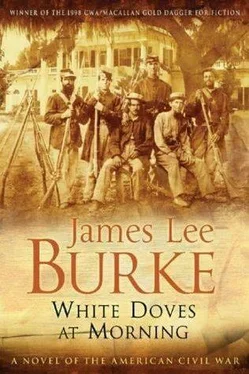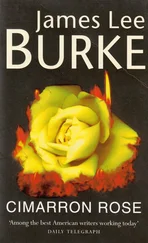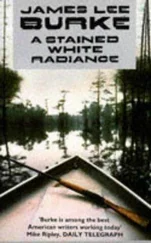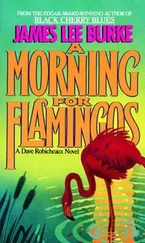"What? What did you say?"
But she stood silently by the open door and refused to speak again, until he finally gave it up and walked out on the gallery, confused and for once in his life at a loss for words. When he glanced back at her, his forehead was knitted with lines, like those in the skin of an old man.
When he got into his carriage she saw him produce a small whiskey-colored ball that looked like dried honey from a tobacco pouch and place it inside his jaw, then bark at his driver.
WILLIE Burke's return journey from Shiloh had been one he did not measure in days but in images that he seemed to perceive through a glass darkly-the emptiness of the Mississippi countryside that he and Elias traversed in a rented wagon, a region of dust devils, weed-spiked fields, Doric columns blackened by fire and deserted cabins scrolled with the scales of dead morning glory vines; the box that held Jim's bones vibrating on the deck of a steamboat and a gaggle of little girls in pinafores playing atop the box; a train ride on a flatcar through plains of saw grass and tunnels of trees and sunlight that spoked through rain clouds like grace from a divine hand that he seemed unable to clasp.
Willie's clothes were rent, vinegary with his own smell, his hair peppered with grit. He drank huge amounts of pond water to deaden his hunger. When the train stopped to take on wood he and Elias got into a line of French-speaking Negro trackworkers and were given plates piled with rice and fried fish that they ate with the trackworkers without ever being asked their origins. At a predawn hour on a day that had no date attached to it they dragged the box off a wagon in front of Willie's house and set it down in the grass. The sky was the color of gunmetal, bursting with stars, the surface of the bayou blanketed with ground fog. "Come in," Willie said.
"I think I'll go out to my mother's place and crawl in a hammock for six weeks," Elias replied. His face became introspective. "Willie, the next time I say I'll help you out with a little favor?"
"Yes?"
"Lend me a dollar so I can rent a gun and stick it in my mouth," Elias said.
Willie walked into the house, not pausing in the kitchen to either eat or drink, and on out the back door to use the privy. He dragged Jim's box onto a wagon at the barn, shoved it forward until it was snug against the headboard, then began stacking bricks in the wagon bed. The stars were fading from the sky now, the oaks along the bayou becoming darker, more sharply edged, against the fog. He heard footsteps behind him.
Tige McGuffy heaved a wooden bucket filled with cistern water across Willie's head and face and shoulders.
"Good God, Tige, what was that for?" Willie asked, spitting water out of his mouth.
"You trailed a smell through the house I could have heat down on the floor with a broom."
"Would you be going out to the cemetery with me this fine morning?"
"Cemetery? What you got in that box?" Tige replied. But before Willie could speak Tige waved his hand, indicating he wasn't interested in Willie's response. "The Knights or them White Leaguers lynched a fellow last night. A bunch of them rode through our yard. Where you been, Willie? Don't you care about nobody except a dead man or a lady ain't got no interest in you? Why don't you wake up?"
AT the school that same morning Abigail Dowling noticed the circles under Flower's eyes, her inability to concentrate on the content of a conversation. During recess Flower shook a ten-year-old boy in the yard for throwing rocks at a squirrel. She shook him hard, jarring his chin on his chest, squatting down to yell in his face. The boy lived in a dirt-floor shack with his grandmother and often came to school without breakfast. Until today he had been one of her best students. The boy began to cry and ran into the street.
Flower caught him and led him by the hand into the shade.
"I'm sorry, Isaac. I was sick last night and I'm not feeling good today. Just don't be chunkin' at the squirrels. You forgive me?" she said.
"Yessum," he said.
He rubbed the back of his neck when he spoke and she could see that neither the pain nor the shock had left his eyes. She got to her knees and held him against her breast. Then she walked to the gallery, where Abigail had been watching her.
"I'm going home, Miss Abby," she said.
"Tell me what it is," Abigail said.
"I don't think I'll be back."
"That's nonsense."
"No, it's a heap of trouble," Flower said.
"I'm going to dismiss the children and take you home," Abigail said.
"I don't need any help, Miss Abby."
"We'll see about that," Abigail said.
It was almost noon, and Abigail told the children they could leave the school early and not return until the next day. While they poured out the front door into the yard and street, she brought her buggy around from the back and went after Flower.
"Get in," she said in front of the hardware store.
"Miss Abby, you mean well, but don't mix in this," Flower said.
"Stop calling me 'Miss Abby.' I'm your friend. I admire you more than any person I've ever known."
Flower paused, then stepped up into the buggy and sat down, her face straight ahead.
"There's a door with a secret catch on it in the side of my house. Last night I woke up with Rufus Atkins and Todd McCain standing by my bed," she said. She glanced back at the hardware store. "They were wearing Kluxer robes and hoods, but it was them."
Abigail reined up the horse and started to speak, but Flower grasped the reins and popped them down on the horse's rump.
"Atkins touched me with his whip, like I was a piece of livestock. He wanted me to know I'd never be free, that he or a hundred like him could come for me anytime they wanted," Flower said. "I'll never get them out of my life."
"Oh yes, we will," Abigail said.
"It's a nigger girl's word against a captain in the Confederate army, Miss Abby. Plus I didn't see his face."
"Don't you dare call yourself that. Don't you dare."
But Flower refused to speak the rest of the way home.
The house and yard and flower beds were marbled with shadows, the wind touched with rain, the cane rustling in the fields. Down the road Abigail could see convict carpenters in striped pants and jumpers framing Rufus Atkins' new house, hammering boards into place, sitting on the crossbeams like clothespins. Farther down the road, past the burned remnants of the laundry, she thought she saw the polished, black carriage of Ira Jamison disappearing around a bend.
Flower got down from the buggy and went inside the house, leaving the door open behind her. Abigail followed her.
"What are you planning to do?" Abigail asked.
"Go to the privy and make water."
"You answer my question, Flower."
"I aim to put Rufus Atkins in hell for what he did to my mother and me. And before he dies I aim to make him hurt."
"It doesn't have to be like this."
"Yes, it does. You know it does. Don't lie. You don't realize how much some folks can hate a lie," Flower said, and went out the back door.
Abigail stood for a long time by the entrance. She felt the wind blowing through the house, twisting the curtains, flipping the pages of a book in Flower's bedroom. She could smell rain outside and see the sunlight disappearing from the yard. She stared through the open door of the bedroom and at the bedroom floor and the pool of shadow under the bed.
When Flower returned from the privy, the house was empty.
"Abigail?" she said into the silence.
She looked outside. The buggy was gone. She glanced through the doorway into her bedroom. The piece of oily flannel in which she had wrapped her revolver lay discarded on the floor.
FOR Ira Jamison anger had never been a character defect to which he attached any degree of seriousness. If your business or personal adversaries tried to injure you, you did not brood over biblical admonitions about an eye for an eye. You buried your enemies alive. Anger wasn't a problem.
Читать дальше












